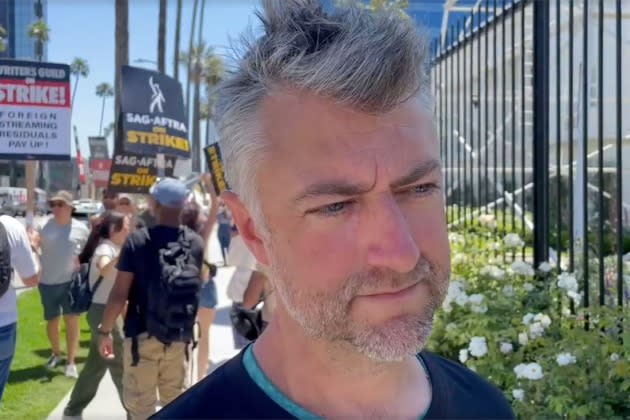Sean Gunn Slams AMPTP for Lack of Residuals From ‘Gilmore Girls’: “It Really Is a Travesty”
- Oops!Something went wrong.Please try again later.
- Oops!Something went wrong.Please try again later.

While out on the picket lines Friday for the first day of SAG-AFTRA’s strike, Sean Gunn didn’t hold back on slamming AMPTP for the lack of residuals he has received for his role in Gilmore Girls.
The actor, brother of DC head James Gunn, told The Hollywood Reporter that he “particularly wanted to come out and protest Netflix” because, despite the show’s continued success since it debuted in 2000, he has not been fairly compensated.
More from The Hollywood Reporter
SAG-AFTRA Reveals What It Claims Were Unresolved Negotiations Issues With Studios
Tom Cruise Lobbied Studios on SAG-AFTRA Stunt and AI Positions (Exclusive)
SAG-AFTRA Strike: What Actors Can Still Work on Without Violating Union Rules
“I was on a television show called Gilmore Girls for a long time that has brought in massive profits for Netflix,” he explained. “It has been one of their most popular shows for a very long time, over a decade. It gets streamed over and over and over again, and I see almost none of the revenue that comes into that.”
Though Netflix streams Gilmore Girls, the residuals Gunn is referencing come from Warner Bros. Discovery — the studio that produced and licenses the series to the streamer. Gunn and his co-stars are paid the same regardless of how many people watch the series wherever the studio places it.
Gunn played Kirk, a quirky resident that lived in Stars Hollow, in the WB-produced series that originally ran for seven seasons from 2000 to 2007. He then reprised his role in Netflix’s 2016 revival, Gilmore Girls: A Year in the Life, alongside Lauren Graham and Alexis Bledel.
The Guardians of the Galaxy star proceeded to call out co-CEO Ted Sarandos and executive chair Reed Hastings for their multimillion-dollar compensation, though he incorrectly blamed the pair for giving “each other bonuses in the tens of millions of dollars.” (The bulk of Sarandos’ and Hastings’ compensation last year, $50.3 million and $51.1 million respectively, came from stock options; bonuses were not a factor according to SEC filings).
“You really need to rethink how you do business and share the wealth with people,” Gunn said. “Otherwise, this is all going to come crashing down.”
The dramedy, which initially ran on The WB, and then eventually The CW, has been a popular title for Netflix since it was added to the streamer nearly a decade ago. But, based on the way current deals are structured, just because a show is performing well on a streamer doesn’t mean actors are getting bigger residual checks from the studio.
Gunn also told THR that other than residuals and performance-based incentives, artificial intelligence and the sharing of streaming revenue are two other issues that are important for him in contract negotiations.
“I can’t pretend that I understand the ins and outs of all the facets of the AI issue, but I know that being compensated for use of one’s likeness is incredibly important and needs to be an equitable part of this deal,” he added. “Sharing in streaming revenue – it needs to be re-thought of. As Fran Drescher (president of SAG-AFTRA) said yesterday, the whole business model has fallen apart really, and so we kind of need to restructure it from the top.”
The actors union officially joined the Writers Guild out on the picket lines on Friday after contract negotiations collapsed with studios and streamers at midnight Wednesday, leading to Hollywood’s first double strike in six decades.
Correction: The original version of this story was updated to clarify that residuals are paid by the studio and not the streamer, and to correct information about Netflix CEO compensation.
Best of The Hollywood Reporter
"This Was One Hot Mess": Lisa Vanderpump, Keke Palmer and the THR Reality Roundtable
Tom Holland Breaks Free: Talking Zendaya, ‘The Crowded Room’ and the Future of Spider-Man

